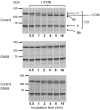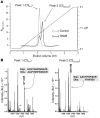Human C3 mutation reveals a mechanism of dense deposit disease pathogenesis and provides insights into complement activation and regulation
- PMID: 20852386
- PMCID: PMC2947238
- DOI: 10.1172/JCI43343
Human C3 mutation reveals a mechanism of dense deposit disease pathogenesis and provides insights into complement activation and regulation
Abstract
Dense deposit disease (DDD) is a severe renal disease characterized by accumulation of electron-dense material in the mesangium and glomerular basement membrane. Previously, DDD has been associated with deficiency of factor H (fH), a plasma regulator of the alternative pathway (AP) of complement activation, and studies in animal models have linked pathogenesis to the massive complement factor 3 (C3) activation caused by this deficiency. Here, we identified a unique DDD pedigree that associates disease with a mutation in the C3 gene. Mutant C(3923ΔDG), which lacks 2 amino acids, could not be cleaved to C3b by the AP C3-convertase and was therefore the predominant circulating C3 protein in the patients. However, upon activation to C3b by proteases, or to C3(H₂O) by spontaneous thioester hydrolysis, C(3923ΔDG) generated an active AP C3-convertase that was regulated normally by decay accelerating factor (DAF) but was resistant to decay by fH. Moreover, activated C(3b923ΔDG) and C3(H₂O)(923ΔDG) were resistant to proteolysis by factor I (fI) in the presence of fH, but were efficiently inactivated in the presence of membrane cofactor protein (MCP). These characteristics cause a fluid phase-restricted AP dysregulation in the patients that continuously activated and consumed C3 produced by the normal C3 allele. These findings expose structural requirements in C3 that are critical for recognition of the substrate C3 by the AP C3-convertase and for the regulatory activities of fH, DAF, and MCP, all of which have implications for therapeutic developments.
Figures










Similar articles
-
Proliferative glomerulonephritis secondary to dysfunction of the alternative pathway of complement.Clin J Am Soc Nephrol. 2011 May;6(5):1009-17. doi: 10.2215/CJN.07110810. Epub 2011 Mar 17. Clin J Am Soc Nephrol. 2011. PMID: 21415311 Free PMC article.
-
Generation of multiple fluid-phase C3b:plasma protein complexes during complement activation: possible implications in C3 glomerulopathies.J Immunol. 2014 Feb 1;192(3):1220-30. doi: 10.4049/jimmunol.1302288. Epub 2013 Dec 23. J Immunol. 2014. PMID: 24367026 Free PMC article.
-
Acquired and genetic complement abnormalities play a critical role in dense deposit disease and other C3 glomerulopathies.Kidney Int. 2012 Aug;82(4):454-64. doi: 10.1038/ki.2012.63. Epub 2012 Mar 28. Kidney Int. 2012. PMID: 22456601
-
Hereditary and acquired complement dysregulation in membranoproliferative glomerulonephritis.Thromb Haemost. 2009 Feb;101(2):271-8. Thromb Haemost. 2009. PMID: 19190809 Review.
-
C3 glomerulopathy.Contrib Nephrol. 2013;181:185-93. doi: 10.1159/000348654. Epub 2013 May 8. Contrib Nephrol. 2013. PMID: 23689580 Review.
Cited by
-
Kidney diseases.Immunol Rev. 2023 Jan;313(1):239-261. doi: 10.1111/imr.13167. Epub 2022 Nov 12. Immunol Rev. 2023. PMID: 36369988 Free PMC article. Review.
-
Efficacy of _targeted Complement Inhibition in Experimental C3 Glomerulopathy.J Am Soc Nephrol. 2016 Feb;27(2):405-16. doi: 10.1681/ASN.2014121195. Epub 2015 Jun 5. J Am Soc Nephrol. 2016. PMID: 26047789 Free PMC article.
-
Complement C1 esterase inhibitor levels linked to infections and contaminated heparin-associated adverse events.PLoS One. 2012;7(4):e34978. doi: 10.1371/journal.pone.0034978. Epub 2012 Apr 13. PLoS One. 2012. PMID: 22514695 Free PMC article.
-
Complement in disease: a defence system turning offensive.Nat Rev Nephrol. 2016 Jul;12(7):383-401. doi: 10.1038/nrneph.2016.70. Epub 2016 May 23. Nat Rev Nephrol. 2016. PMID: 27211870 Free PMC article. Review.
-
The C5a receptor has a key role in immune complex glomerulonephritis in complement factor H-deficient mice.Kidney Int. 2012 Nov;82(9):961-8. doi: 10.1038/ki.2012.249. Epub 2012 Jul 25. Kidney Int. 2012. PMID: 22832515 Free PMC article.
References
-
- Lachmann PJ. The amplification loop of the complement pathways. Adv Immunol. 2009;104:115–149. - PubMed
Publication types
MeSH terms
Substances
Grants and funding
LinkOut - more resources
Full Text Sources
Other Literature Sources
Medical
Research Materials
Miscellaneous

